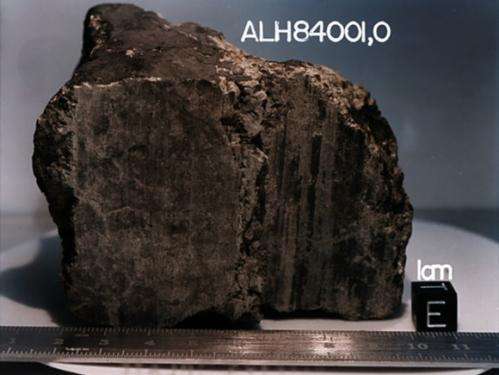Life from Mars could have 'polluted' Earth: Krauss

Unless you've been living under a rock—Earth or Martian—in the past month, surely you have heard about the Curiosity rover's landing and early adventures on Mars.
The prospects for what the rover could find has many in the space community very excited, even though Curiosity is supposed to look for habitable environments, not life itself.
However, a couple of weeks ago, noted theoretical physicist Lawrence Krauss said he wouldn't be surprised if we do find evidence of life on Mars.
In an interview with CNN (below), Krauss said it's possible Martian life could have "polluted" Earth early in our planet's history, giving rise to life as we know it today.
"The big surprise (in finding life) would be if it weren't our cousins. Because what we've learned is that material goes back and forth between the planets all the time. We have discovered Martian meteorites in Antarctica, for example, and it goes the other way around, and microbes certainly (can) survive the the eight-month voyage in a rock."
Though Krauss did not specify which meteorites in Antarctica he was referring to, he is most likely talking about ALH84001, which was found in 1984.
The meteorite shot to international prominence in 1996 when scientists, led by NASA's David McKay, published an article in the journal Science saying there was evidence the meteorite showed "primitive bacterial life" from Mars. In particular, they used a high-power electron microscope and found formations that they said are consistent with those caused by bacterial life.
The team's proclamation met with scientific skepticism. The Lunar and Planetary Institute's Allan Treiman said even if it did show evidence of life, the rocks could have been contaminated by Antarctic life or by handling of the meteorite after it was found.
John Bradley, an adjunct professor at the Georgia Institute of Technology, took his skepticism a step further: "Unfortunately, there are many signatures in the fossil record here on Earth, and probably on Mars, that look very similar to bacterial signatures. But they are not unique to bacterial processes," he said in an undated NASA page (most likely from 2001, since it references a meeting from that time) that was reportedly based on a SPACE.com story.
NASA revisited the sample in 2009 with more advanced equipment and argued that life was the most plausible explanation for the formations. In a paper published in Geochimica et Cosmochimica Acta, the authors rejected the alternate hypotheses of shock or heating affecting the meteorite based on their experiments.
That said, the 1996 announcement is still a long way from confirmation. Krauss' interview is below. What do you think of his views of Martian life?
Journal information: Science , Geochimica et Cosmochimica Acta
Source: Universe Today





















